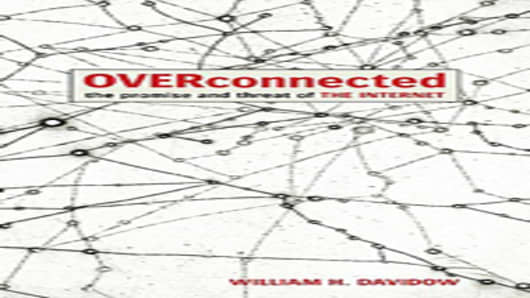We all know that the Internet makes many things in our lives a lot easier, but now some are asking the tough questions about what it truly means to be "on" and "connected" in our new 24/7 world.
The LA Times recently wrote, "Americans now spend about 13 hours per week on the Internet (the same amount of time as TV-watching), and cite a Stanford studythat explored iPhone “addiction." Many college students even reported sleeping with their iPhones.
So as we grow ever more dependent on a web way of life, perhaps it's a good time to take a look at what we're actually getting with each and every click.
In "IS THE INTERNET CHANGING THE WAY YOU THINK The Net's Impact on Our Minds and Future," John Brockman takes a look at how the web affects everything from the way we speak, read, watch tv, socialize, find information, find work - even how we find love. By collecting thoughts on the subject from some of the world's greatest thought leaders, Brockman asks the reader to consider the internet's role in our lives and what it means to have a 'wired brain.'
In "THE NET DELUSION The Dark Side of Internet Freedom",Evgeny Morozov makes a compelling argument of why we have to stop thinking of the Internet and social media sites as a place soley for freedom seekers.
Instead, the author asks, "Does the Internet empower dictators and their opponents in equal measures...and are there unfair advantages that the Internet grants dictators?
Using many examples, Morozov cites how the Internet has been used to thwart a revolution and the rise of democracy including:
-"In Russia, the 'Movement Against Illegal Immigration' uses Google Maps to create mashup maps of ethnic minorities' homes, urging people to find and harass them.
-In Iran, after the June 2009 rallies, the Revolutionary Guard posted photos of the most ardent protestors, asking pro-Ahmedinejad Iranians to help identify them
-In Lebanon, the most active user of new media is now the Hizbollah"
In "OVERCONNECTED: The Promise and Threat of the Internet" by William Davidow we see how our "plugged-in" lives now face unpredicted challenges and dangers.
Not one to trash the many great things that the Internet has brought to our world, this former Intel Exec does offer a dose of reality of the perils of being overconnected. In fact he blames "overconnectivity" for playing a role in the collapse of Iceland's economy and even in the 2008 real estate bubble.
Looking at the 2008 financial crisis, Davidow writes:
"It is impossible to really understand what went on in the worldwide economic crisis of 2008 without examining the role that the Internet played in supercharging it. Without the Internet, the credit mess would have undoubtedly caused a recession of some magnitude. While we can never measure the Internet's full effects, we know that it made the current crisis larger, more widespread, and more virulent. It not only carried the information, it helped spread what is known as a "thought contagion." That is, the rate at which greed and fearmongering took place—via instant access to news and online rumors—was accelerated to unprecedented levels."
William Davidow has written a Guest Author Blog,"Can Google Survive the Internet" - you can read it by clicking here.
Email me at bullishonbooks@cnbc.com — And follow me on Twitter @BullishonBooks





